Editor’s Note: This article first appeared in American Thinker.
A couple of weeks ago, President George W. Bush gave an outstanding speech to the Knesset, the Israeli parliament. It stands out among the top five or so best speeches of Bush’s two terms, and probably one of the top two speeches dealing with his long-term vision for the Middle East and the world—the other being his November 2003 speech before the National Endowment for Democracy. Any political science professor who teaches the Bush presidency and ignores this speech is derelict in duty.
The occasion for the speech was the 60th anniversary of the founding of the nation of Israel, which, said Bush, in one of many eloquent passages, “was more than the establishment of a new country. It was the redemption of an ancient promise given to Abraham, Moses, and David.” The president recalled how 11 minutes after that moment, America, on the order of President Harry Truman, was the first nation to recognize Israel’s independence. What Bush didn’t say was that not only was America alone then, but so was its president—who recognized Israel in defiance of his staff, from Secretary of State George Marshall to Secretary of Defense James Forrestal—and that America did not support a desperate Israel in the immediate Arab invasion that followed. On May 15, 1948, Joe Stalin’s Soviet Union did more for Israel than the United States. Only decades later could an American president rightly say, as Bush did last week, that “America is proud to be Israel’s closest ally and best friend in the world.”
Like Truman in May 1948, Bush, in May 2008, is again bucking the tide with his vision for not only Israel but the wider Middle East. That vision was on display in this speech.
Bush underscored in this speech, for the hundredth time during his presidency, his unyielding belief—some say exaggerated—in the potential of democracy. He noted that Israel remains a bulwark for democracy in the Middle East—and thus it is a “shame that the United Nations passes more human rights resolutions against the freest democracy in the Middle East than any other nation in the world.” Amen. Further, he argued that free societies are peaceful societies. This was, yet again, Bush’s consistent affirmation of his belief in “democratic peace.” “[T]hat freedom yields peace,” maintained Bush, “is the great lesson of the 20th century.” And now, he insisted, “our task is to apply it in the 21st.”
That, in a nutshell, is the Bush vision for the Middle East: a long-term democratic revolution to transform the world’s most volatile region into (hopefully) a free, peaceful region—beginning now in Iraq.
In this speech, he went further than he has before, envisioning the region 60 years from now, waxing idealistic about possible future democracies from Lebanon to Syria to Egypt, while conceding that such a “transformation” and “bold vision” is one that many judge “can never be achieved.” For the doubters, he asked that they recall what they witnessed in their own time: a genocidal, war-addicted Europe that is now free and at peace; a Kamikaze Japan that is a democratic “lynchpin of security” in Asia; and an Israel of desert and refugees that is now one of the most free and successful nations on Earth—not only a Promised Land but a “light unto the nations.”
Bush also took a subtle, much deserved swipe at Jimmy Carter (unnamed) and the moral equivalency that the 39th president continues to represent long after his presidency. Bush made it very clear that Hamas, a terrorist organization whose charter calls for the “elimination” of Israel, is not a group worthy of dialogue, nor is Hezbollah and Osama Bin Laden. Nor, likewise, is Iran, as Bush stated succinctly: “Permitting the world’s leading sponsor of terror to possess the world’s deadliest weapon would be an unforgivable betrayal of future generations.”
The struggle of the 21st century, said the president, remains at its “core” an “ancient battle between good and evil.” The fight against terror, said Bush, “is the defining challenge of our time. It is more than a clash of arms. It is a clash of visions, a great ideological struggle.”
Bush was speaking as much about himself as his country when he told Israel’s government: “As we go forward, our alliance will be guided by clear principles—shared convictions rooted in moral clarity and unswayed by popularity polls or the shifting opinion of international elites.” And he told Israelis than when they confront “terror and evil,” their population of seven million is actually 307 million strong, because all of America stands with them.
These were big ideas in a big speech. The lingering question is not only whether Bush will be vindicated one day but, yet again, how and why another splendid, truly historic speech seems to have received so little notice. Sure, it made the usual news cycles, but this was a landmark address made in a landmark place in the final months of the Bush presidency. The thinking expressed by Bush at the Knesset last week—and so eloquently and forcefully—remind of Kennedy in Berlin, of Reagan at the Brandenburg Gate, of some of the best modern presidential speeches.
The lack of resonance is as perplexing as troubling. It is indicative of how and why this president steadily declines as one of the least popular in generations—as unheralded as his very best speeches. George W. Bush’s legacy is akin to the 60-year projection he laid out in his speech. It awaits the test of time, and he won’t live to see it.


